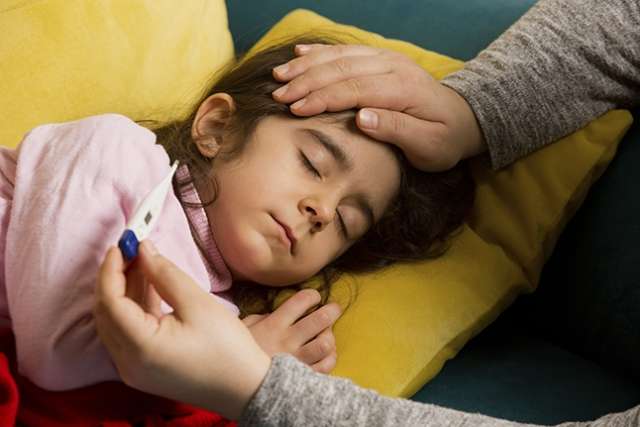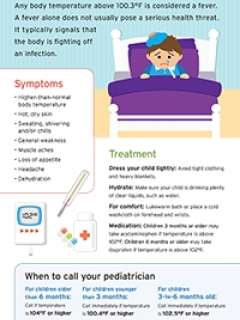
Several factors can affect a child’s normal body temperature (98.6°F), including time of day, age and activity level. While slight variations can be normal, any body temperature above 100.3° F is considered a fever.
Understanding fevers
As a parent, you may feel distressed when your child has an abnormally high body temperature. In most cases, however, a fever alone does not pose a serious health threat to an otherwise healthy child. Most often, a fever signals that your child’s body is fighting off an infection — the most common cause of fevers.
It is also normal for your child’s temperature to rise at night. “Everyone’s body temperature naturally fluctuates throughout the day, reaching its highest level during the evening time,” says Carlos Lerner, MD, UCLA pediatrician. This natural increase, combined with the higher temperature associated with a fever, can cause additional discomfort during the night.
To check your child’s temperature, you can use oral, rectal or ear thermometers. For infants, a rectal thermometer is recommended.
Treatment
Treatment may vary depending on your child’s age and body temperature, but in most cases, parents should begin by addressing their child’s heat-related discomfort. “Dress your child lightly and avoid tight clothing and heavy blankets,” Dr. Lerner advises. “Make sure your child is drinking plenty of clear liquids, such as water.” For comfort, you can also give your child a lukewarm bath or place a cold washcloth on his/her forehead and wrists.

If your child is older than 3 months of age with a temperature above 102°F, you may give him/her acetaminophen. Children older than 6 months of age may take ibuprofen. “Children older than 3 months of age with temperatures below 102°F do
not typically require medication,” says Dr. Lerner. “In most cases, the fever will self-resolve within three days and your child can return to school or daycare after being fever-free for 24 hours.”
Symptoms
- Higher-than-normal body temperature
- Hot, dry skin
- Sweating, shivering and/or chills
- General weakness
- Muscle aches
- Loss of appetite
- Headache
- Dehydration
When to call your pediatrician
Contact your pediatrician if your child has a temperature of 104°F or higher, has a fever that lasts more than 3 days (or 24 hours for children below age 2), or is exhibiting signs of a more serious illness (e.g., seizure, irregular breathing, stiff neck, vomiting or not eating/drinking). If your child is younger than 3 months old and has a fever of 100.4°F or higher, or is 3 to 6 months of age with a fever of 102.5°F or higher, call your pediatrician immediately.




